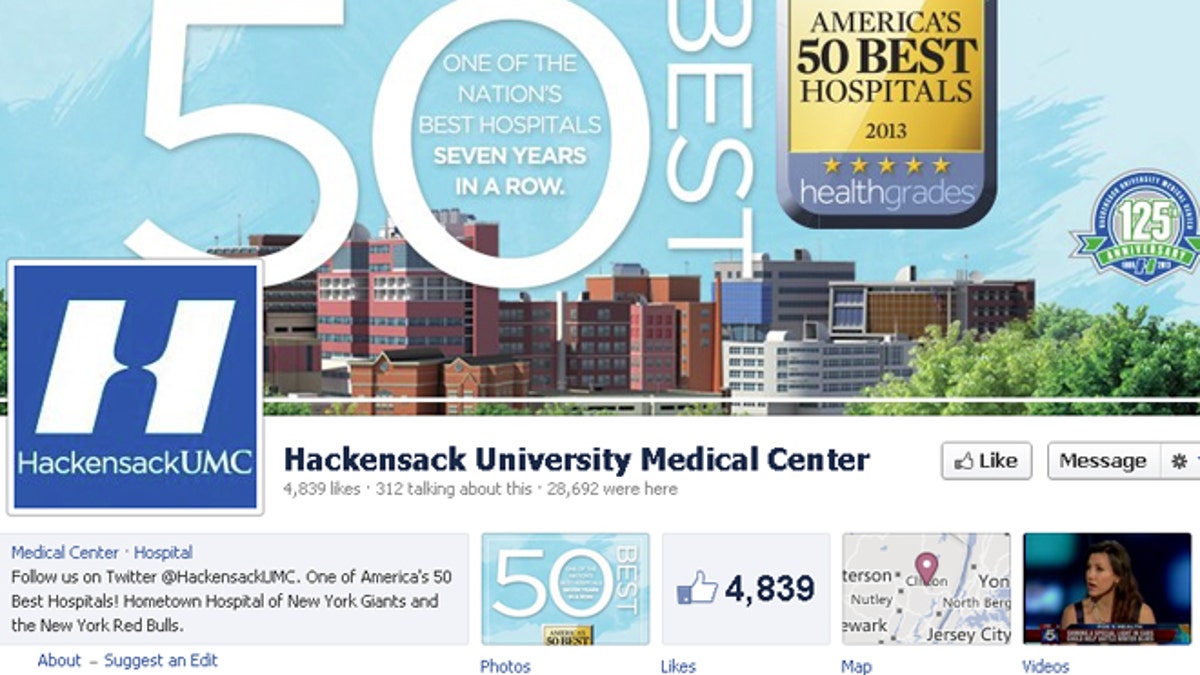
Hackensack University Medical Center's Facebook page, which shows the amount of 'likes' it has. Incidentally, the hospital has a lower mortality rate.
If you’re trying to decide what hospital has the best record in terms of safety and patient satisfaction, you may want to check in first with Facebook.
A new study, published in the American Journal of Medical Quality, found the social media site was a reliable indicator of hospital quality.
"Any hospital can start a Facebook page, but those with higher levels of quality and patient satisfaction are more likely to attract 'likes' to their page."
Compared with other businesses, hospitals have been behind the social media curve. According to a 2011 study of hospitals in the New York City metropolitan area, only about half had a Facebook page. And the ones who do have a page, don’t allow comments or interactions, limiting the effectiveness of social media.
For this study, the researchers wanted to ask three questions: How many hospitals in a sample of 82 hospitals in the New York City area had a Facebook page? How many “likes” did the hospital have? Is the number of “likes” on a hospital’s Facebook page correlated with traditional indicators of quality and patient satisfaction?
The researchers compared the 30-day mortality rates from heart attacks and data showing the percentage of people who would recommend the hospital to the number of “likes” on the hospitals' Facebook pages.
They found less than half the hospitals had a Facebook page. Of those that did, “likes” were positively associated with the percentage of recommendations. What’s more, for every one percentage point decrease in the 30-day mortality rate, there were almost 93 more “likes” on Facebook.
In fact, “likes” were more predictive of mortality rates than patient recommendations (those who said they would recommend the hospital).
The study also found that teaching hospitals had a lower number of “likes” than traditional hospitals. The researchers suggested that this may reflect quality issues at these hospitals.
"Any hospital can start a Facebook page, but those with higher levels of quality and patient satisfaction are more likely to attract "likes" to their page," the authors wrote. "Public health researchers and hospitals can use Facebook "likes" as a proxy for hospital quality and patient satisfaction."
One of the hospitals with the highest number of “likes” and the lowest mortality rates was Hackensack University Medical Center in New Jersey.
A recent Facebook comment read, “I want to thank everyone at the Antepartum Dept., Labor and Delivery, Mother and Baby East wing, and especially to all the staff in the NICU Dept. Love you all and you guys are all like my family.” Now that’s some hospital love.
The authors conceded that a number of factors can contribute to “likes” including how many posts the administrators make, whether visitors are allowed to make comments on the page and other tactics encouraging viewer participation.
But when they controlled for these factors, they still found an association between “likes” and mortality as well as recommendations. Still, Facebook should only be a starting point. Though most hospitals with more “likes” had the lowest mortality rates, some hospitals with a low number of likes also had low mortality rates.
To find out more about a hospital’s level of care and patient satisfaction, you can also go to Consumer Report’s hospital ratings page and to the Hospital Compare webpage of the federal government’s Medicare website.
